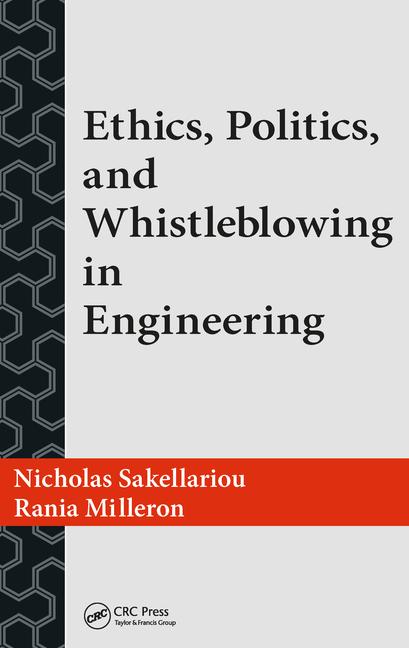Creating Ethical Engineers
Review of
Ethics, Politics, and Whistleblowing in Engineering
New York, NY: CRC Press, 2019, 259 pp.
Although I am not an engineer, my appointment as professor of technology and policy is in the Massachusetts Institute of Technology’s School of Engineering. As a scientist trained in economics and the law, I encounter engineers in all my graduate-level technology, law, and sustainable development courses. These engineering students have clearly recognized that their chosen field, defined as the application of science and technology to human problems, necessarily incorporates values in its discipline.
Ethics, Politics, and Whistleblowing in Engineering, edited by Nicholas Sakellariou and Rania Milleron, takes that insight as its starting point. This remarkable book ought to be taught early in the education of every engineer. And lest potential readers be put off that the book’s title includes the newly ubiquitous term “whistleblowing”—which I support as a way to bring unsafe, unethical, or illegal practices to light—this insightful work is really about “putting values to work in the profession of engineering.”
The book is composed of three parts: “Engineering Leadership,” “Daily Practice,” and “Raising the Bar.” Through an impressive collection of essays from a range of practitioners and experts, the book recounts the views and experience in education, practice, and values of “ethical engineers.” These essays should prompt students of engineering, as well as the chairs of their various departments and their deans, to think seriously about why they are doing what they are doing—and why they are teaching what they are teaching.
The first part, “Engineering Leadership,” offers a number of perspectives on the role of the engineer in society, from within the engineering community itself and from other disciplines, such as anthropology and cultural studies. These essays identify an important distinction between legal liability and the ethical and humanist responsibilities of the engineer; the urgent need to rectify the serious underrepresentation of women and minorities in engineering; and the obligation to develop a culture of caring that can transform what the Sheffield Hallam University professor Alison Adam calls a “masculine model of morality” with an alternative approach to ethics that is “more inclusive of both genders.”
In the second part, “Daily Practice,” a variety of engineering experts and practitioners discuss learning from disasters, the inadequacy of current standards, and the human ramification of engineering design, as well as the role of product and tort liability in protecting consumers. Safety is a necessity and a right that engineers owe to their local community and the general public. Preventable technological disasters remain an ever-present danger; a case in point is the ongoing Boeing 737 MAX saga, in which it appears that poor oversight contributed to two airplane crashes within five months, killing 346 people. Another conspicuous example is the failure of both the United States and the European Union governments to prohibit the use of the pesticide chlorpyrifos, despite evidence of its danger to children and infants.
This section of the book, which acknowledges that engineers can and do learn from the mistakes and critiques of other engineers, asks how free engineers really are to prevent disasters when they are financially and professionally dependent on profit-driven bureaucracies. It also discusses the blurring of the distinction between engineers and managers in industrial firms, and how this affects their view of engineering work. Finally, several chapters in the section address the importance of encouraging whistleblowing to expose errors or unethical conduct. One fascinating contribution by Tekla S. Perry, a senior editor for IEEE Spectrum, even provides a guide for engineers considering speaking out about employers’ wrongdoing.
The final part, “Raising the Bar,” offers creative, concrete, and sustainable solutions to the dilemmas laid out earlier in the book. As the editors note in their introduction to this section, the fact that “engineers have become increasingly more reflective about the impacts of their practice in society and the environment at large” indicates that a cultural shift is at hand, even if this shift is not yet sufficiently reflected in the teaching of engineering.
The essays in this section demonstrate that engineers can be the change agents needed in achieving sustainable development—a subject I’ve studied and written about extensively, including in Technology, Globalization, and Sustainable Development: Transforming the Industrial State, coauthored with Ralph P. Hall, to which I would direct readers interested in learning more. The essay in Ethics, Politics, and Whistleblowing in Engineering by Dublin Institute of Technology sociologist Eddie Conlon makes the case for training what he calls the “new engineer.” This “broad based professional who is socially and environmentally responsible” can strike a better balance between employability, which requires developing the skills needed to be an effective engineer, and social responsibility, which calls for understanding the field’s role in efforts at sustainability and equity.
Ethics, Politics, and Whistleblowing in Engineering is suffused with the zeal of Ralph Nader, the consumer protection advocate and political activist. Nader helped to transform thinking about engineering and safety with Unsafe at Any Speed, his 1965 exposé of the automobile industry. He also, appropriately enough, wrote the foreword to this valuable book. Years ago, I hosted Nader in an address he gave at a career development session held at MIT. There, he suggested that engineering graduates ask a prospective employer “Can I bring my conscience to work?” More than ever, engineers need to ask themselves and their employers, “Is my conscience welcomed in the enterprise?” And engineering students should demand that the ideas presented in this book be taught and discussed.

